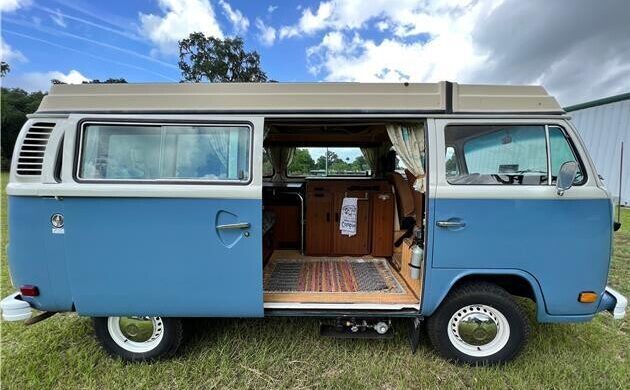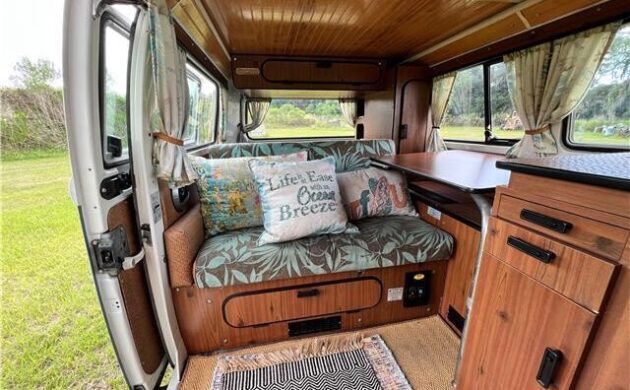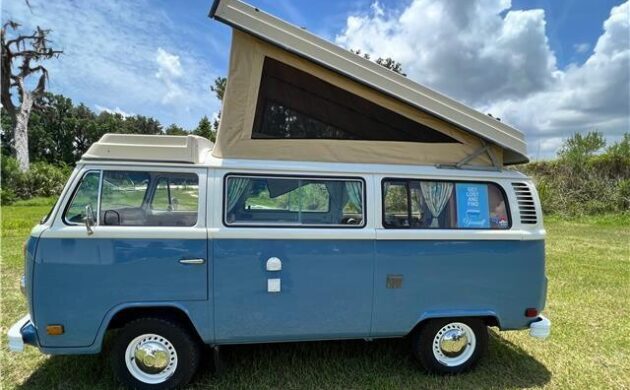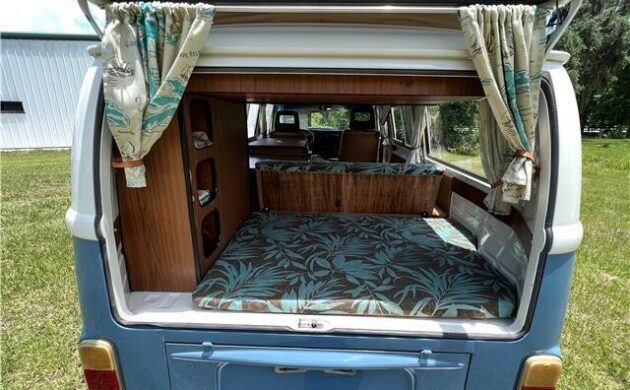For some, a dream car would be an all-original car, which has worn its scars throughout life with pride. Even better if it’s the cult-classic the VW Westfalia which has an enormous following, so much so that VW is bringing back the bus as an EV. But the example we have here today has been restored, but with its original interior and is powered with its rebuilt petrol engine, is in running condition having completed a 1300-mile journey recently, and is available here on eBay in East Palatka, Florida for $29,500 with over 75 bids and the reserve unmet.
Given the popularity of the VW Bus, it’s not a surprise that this is attracting serious attention from bidders. This example appears like a great running project. On the inside, we are treated to the original cabinetry, new upholstery, and lots of factory options, including AC, power and water hook-ups, plus a sink and gas stovetop. This California van has had a lot of care and attention on it over the years, including a full engine rebuild 12,000 miles ago, and can be driven away by the lucky purchaser. Westfalia was a subcontractor who would take the original VW bus and convert them for customers – they were even sold in VW dealers all the way up to 2003. The best part about this was that owners could purchase their VW through the ‘Tourist Delivery Programme’ and pick it up in Germany, drive it around Europe and then have it shipped home.
This Westfalia has California vibes within the interior and comes with lots of practical elements to make this a perfect camper. The roof pop-up tent is in great condition and the full kitchen units underneath this would make for an easy vehicle for camping trips. The wooden interior still has its original fixtures and fittings in a very 1970s style but has worn its age well. On the exterior, we are treated to what looks like a respray which would suggest that this Westfalia went through a restoration at some point in its life.
The seller kindly provides lots of photos of the undercarriage which is clean and without a spot of rust. They also provide full-service records giving the next owner a lot of confidence in their purchase. So where would you take this original 1978 VW Camper – to its next adventure or to the restoration shop to bring it up to modern specification?









Had a ’77 out of the line of bright colors and matching interiors. Ours was bright orange and a orange plaid interior. The other bright colors were international green, yellow, and bright blue. That package came with jalousie windows on both sides, an icebox under the kitchen area and a cabinet behind the passenger seat with a shelf that pulled up to give an outside table. Also had dealer installed AC. One thing we didn’t have that this one has is the propane stove. Great fun with that one. Nice one here.
But, oh, so slow. Outfit in CA can put a Subaru drivetrain in and make it safe to go up hill on the Interstates. Otherwise you are in the truck lane, or worse. In a front collision, you are toast, but, then again, you won’t be going fast enough, most of the time, more likely to be hit in the ass. But, otherwise, a great vehicle.
That’s a type 4 motor..like they put in the 914 Porsche. If its a 2 litre it should be putting out about 90 hp which is not bad and can be bumped up quite a lot..if you dont need the van to pass California smog! I disagree that these are that slow..we took one on many surf trips cruising the motorways of the UK at over 70….and that was with a 1.8 motor. This looks very nice and I would leave it as is and enjoy it..hate the idea of putting a wzter cooled motor in an air cooled van/car..
I remember the day these were very common in California…until smog check crap came in. There was or is no way to pass smog in CA and actually parts for smog related issues in these are impossible to aquire… Therefore NOT POSSIBLE TO BUY FO CALIFORNIANS
I am PRETTY SURE that the color scheme on this is not original. So..what’s under the paint? The AC belt runs BEHIND the fan shroud and is a PITA to adjust/replace. Also, to make room for the compressor, they “hacked” the LR corner of the engine compartment. It is tough to get them air-sealed after the AC installation. The 2.0 in the bus is NOT the same 2.0 that went in the 914/912E They had different heads etc. This engine is rated for 67 hp which is BETTER than the 58-60hp 1600 that the earlier buses had but not a “powerhouse”. If you’re going to USE one of these, a water cooled Vanagon with a Subaru is a MUCH better machine. People STILL wave/flash their lights when you go down the road. Air cooled buses in the mountains? Oh..people wave..As they finally pull around you on the hills they wave and show that you are “NUMBER ONE”…
Steve. The AC compressor on our ’77 was in the right rear corner of the engine compartment and ran off a double pulley along with the generator. I’ve seen many aftermarket variations the the ACs on these things. Never saw one with the power coming out of the rear but, like you said, that would be a chore to do anything with.
The “official” AC system on these from VWoA, (built in Forth Worth Texas) was as I described. The dealer had the microfiche on the whole system including the plastic tab that replaced the raised LR corner metal that had to be cut out. These were, as I understand, often dealer installed. Otherwise they were “hung on” at the docks when the vehicle arrived. If you look at the left side of the fan shroud, there are 4 bolt holes which were there simply for this installation. On the crank is the 3-lobed hub to drive the fan. W/O AC there was a washer to act as a spacer. That was removed and a sheet metal pulley installed. The steel compressor bracket was hinged on the top and a plate bolted to the side of the York/Tecumseh compressor. The plate and bracket extended below the compressor and there were two bolts with shims to adjust the compressor distance to tighten the belt. Some of the new aftermarket systems do the same thing but with a much smaller compressor which doesn’t require body “mods” (“hack” is the term I’d use….)
Then we need to talk about the condenser which was mounted amidship on the frame rails and had electric fans (which ALWAYS seized up) to draw the air across the fins. Buying a bus with AC means that the engine is air cooled with the driver having only a slight chance of the same…